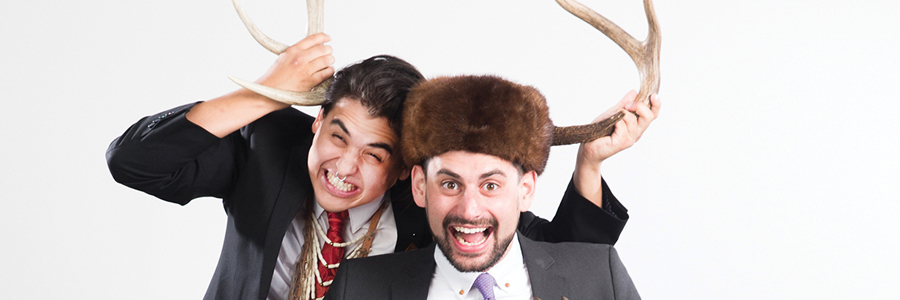Growing up in Edmonton, Todd Houseman felt disconnected from his Indigenous roots. His father hailed from the Paul First Nations but had been fostered, and then adopted, by a Polish-German family. Although Houseman’s dad later reconnected with his biological family, it wasn’t enough for his son to connect with his own Cree heritage.
“I’ve spent a lot of my adult life researching and trying to connect with that part of my identity,” he says. “Mainly through books and different people I’ve met, but it’s hard to connect with a culture that’s based so much in community.” But in recent years, Houseman has found that using his creative talents as an improv performer, actor, and writer helps him to tap into his heritage and share it with the wider public.
This was the impetus behind Folk Lordz, an improv troupe Houseman created with fellow improviser Ben Gorodetsky. The duo met a few years ago as rookie players at Edmonton’s Rapid Fire Theatre, where they performed together in the company’s weekly Chimprov and Theatresports shows. “We kind of clicked with our performance styles,” says Houseman. Soon after, they acted together in a children’s play called Boogie Monster Club, in which three children come to Edmonton from other places (Ukraine, South Africa, and the First Nations community of Maskwacis). “Coming out of that, we realized we both had a strong interest in and affinity for cultural storytelling,” says Gorodetsky.
“We chose that community because my parents had recently been through there and spoke with old storytellers who could tell stories from before colonization.”
They decided to create a long-form improv show that tapped into Houseman’s Cree heritage and Gorodetsky’s Russian culture (his parents emigrated from the former Soviet Union when he was still in utero). Since its debut at Rapid Fire Theatre four years ago, Folk Lordz has performed at festivals across Canada including the Vancouver International Improv Festival, the Winnipeg Fringe Festival and the Toronto Fringe Festival.
The show is organized into three parts: an homage to a Cree creation myth, an interpretation of the existential Russian playwright Anton Chekhov, and a wildcard suggestion from the audience. However, the duo is quick to note that because their work is improvised – and therefore it’s a new show every time – they don’t actually retell a Cree creation myth. In keeping with the tradition of oral storytelling, creation myths must be meticulously memorized and told very carefully, as each word contains specific meaning and information. “There’s so much loaded into each line of a story,” explains Houseman. In addition to its main narrative – often about how something came into being and with an animal as the protagonist – a creation myth contains valuable information about an Indigenous community’s geography, plants and animals, culture, history and much more. Rather than telling the story itself, Folk Lordz performs a reflection or homage based on the story or its themes. By the end of the performance, audiences leave with new knowledge about Cree culture and hopefully have an understanding of what it means to be Indigenous in a colonized place. “It’s kind of empowering Indigenous culture and making it a little more accessible,” says Houseman.

To deepen their own understanding of Indigenous culture, both actors travelled to Yellowknife, N.W.T., last March to conduct research with several Dene elders. “We chose that community because my parents had recently been through there and spoke with old storytellers who could tell stories from before colonization,” says Houseman. Because some stories told by Indigenous people in Alberta have changed as a result of colonial influences (including that of the Catholic Church), both actors wanted to get a grounding in authentic, pre-colonial creation stories. The research trip, funded by the Edmonton Arts Council, also helped to broaden their knowledge of oral storytelling. “One of the biggest things we took away was the importance of geography,” says Houseman. Now the duo tries to incorporate references to local geography wherever they perform. The second portion of Folk Lordz uses the works of Chekhov as a springboard for exploring Gorodetsky’s Russian culture. “He was a shining example of Russian drama and literature that is known in the West,” says Gorodetsky. “We wanted something that’s both educating and curious to people, but also relatable, to a degree.” Unlike the playful, lighthearted Cree creation myths, this segment of the show is dramatic and explores the darkness of the human condition. Characters struggle to communicate, can’t get what they want, or are paralyzed by choice. While the first and second parts of the show explore the cultures of Houseman and Gorodetsky, the third is meant to represent the audience’s own culture. To that end, audience members are asked to pick the concept, loosely based around popular culture. “It’s never the same,” says Gorodetsky. Past shows have explored Michael Jackson music videos, Westerns, and beat poetry. On one memorable occasion, the audience picked Count Chocula cereal.
The result is “effervescent,” as Gorodetsky puts it. In keeping with the spirit of improv, Folk Lordz is a high-energy performance that breaks down the invisible barrier between the stage and audience. Both actors interact directly with the audience, not only by asking for prompts but acknowledging the crowd’s responses to scenes. “I think what’s intoxicating for people at our show is that the fourth wall is porous,” says Gorodetsky. “Anything is possible.”
But they also aim to break down cultural barriers to create an experience that affects audience members in a meaningful way. “Alongside the entertainment, people get this incredible opportunity to learn something about history and culture that they might not have had before. It empowers people to understand things about indigineity and multiculturalism that isn’t often part of a comedic performance,” Gorodetsky adds.
In fact, Houseman and Gorodetsky are passionate about using their work to promote the equality of First Nations people. They hope Folk Lordz can help to “decolonize” (eliminate oppression of First Nations people) and indigenize (include more Indigenous voices) the arts. To reach a wider audience, and include more First Nations people, they recently produced an Edmonton storytelling celebration called Stories on The Hills. Supported by Edmonton Community Foundation (ECF), the March event was held at Fort Edmonton Park and featured not only Folk Lordz, but respected Indigenous storytellers (Elder Jerry Saddleback and Grand Chief Tony Alexis), musical entertainment by Quantum Tangle and visual storytelling through painting and poetry by Lana Whiskeyjack.

“It was kind of an extension of Folk Lordz – the idea of bringing together many cultures,” says Houseman. The response from the community was overwhelmingly positive: “We were completely sold out.” The event connected him and Gorodetsky to many Indigenous activists, artists and community members in a number of First Nations cultures in and around Edmonton. The duo hope to organize the event again next year. “Our goal is to grow it into a multi-day festival,” says Gorodetsky.
There are big changes ahead for Folk Lordz, as well. This spring, Houseman and Gorodetsky were both individually nominated for a Mayor’s Celebration of the Arts Emerging Artist Award, which honours Edmonton artists in diverse disciplines. Gorodetsky won the award and they’ve also received funding from the Edmonton Arts Council to create a new version of Folk Lordz that will follow the same three-part structure but with a very different aesthetic. The first part of the show will explore Indigenous culture through the history, specifically the “horse wars” fought between the Cree and Blackfoot peoples. The second part will explore Gorodetsky’s Jewish roots, through several comedic Yiddish traditions including “The Wise men of Chelm” – folklore centred around the idea of the village idiot. As with the original incarnation of Folk Lordz, the duo conducted extensive research to inform the performances (including plenty of library time and a visit to the Blood Nation in southern Alberta to learn more about Blackfoot history). After this, Houseman and Gorodetsky returned to the studio to do the creative work, first improvising with one another and then workshopping their performance with local theatre talent.
The show debuted this summer during the troupe’s tour of festivals across North America, including Toronto, Winnipeg, Vancouver and Philadelphia. As with the first incarnation of Folk Lordz, both troupe members hope the new show will be entertaining and thought-provoking, but also reveal the possibilities of improv as a genre. “When people associate improv with comedy, that’s limiting,” says Gorodetsky. “We’re excited to show the theatricality.”
